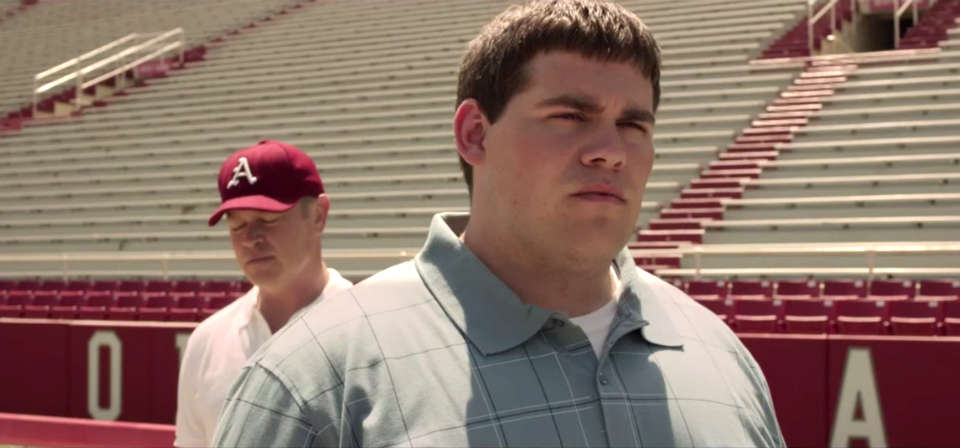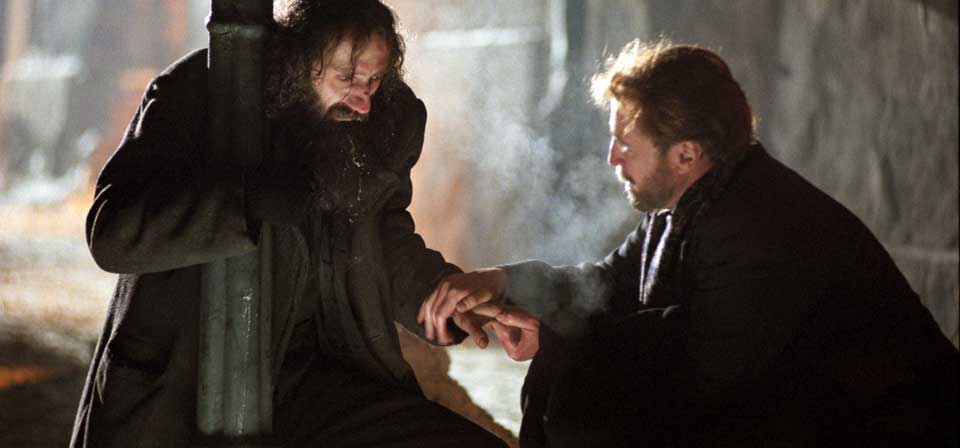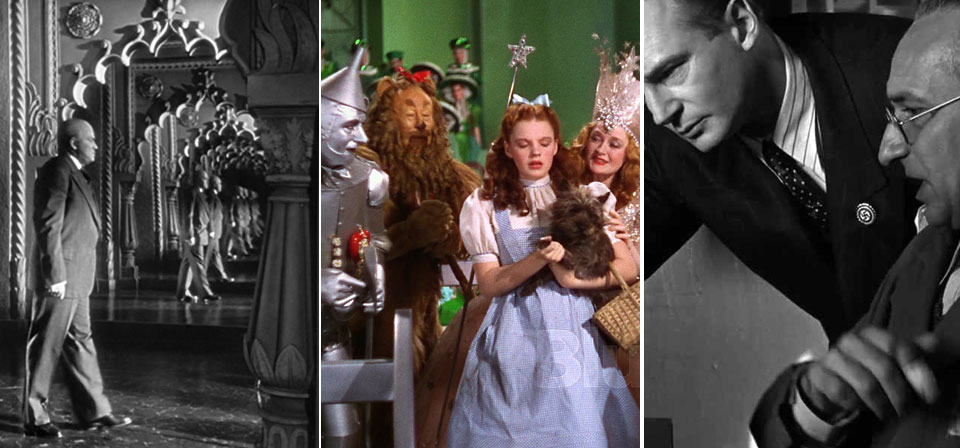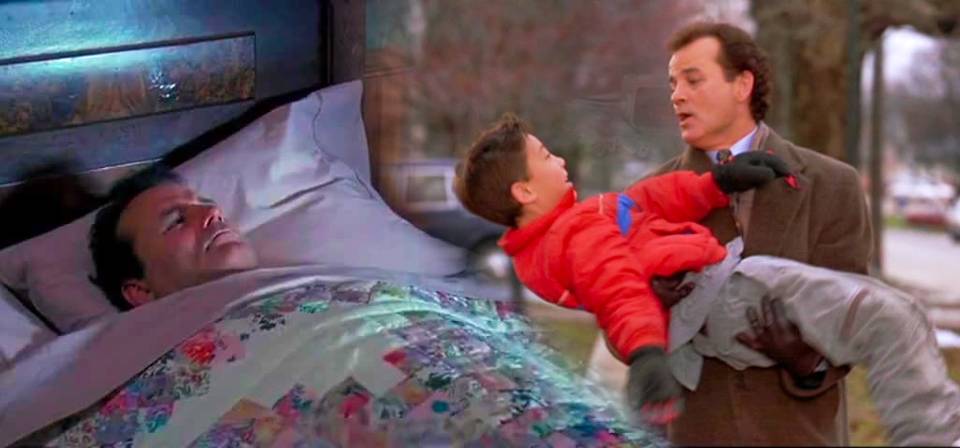Search Results
67 records found
Gravity [video]
Sandra Bullock shines in Alfonso Cuarón’s mesmerizing action thriller in space, a rare Hollywood spectacle with a touch of spiritual awareness.
The Great Gatsby [video]
The Great Gatsby in 60 seconds: my “Reel Faith” review.
The Great Mouse Detective: Rise and Fall of the Mouse
From the beginning the rodents were always there, tiny sidekicks running around in the periphery of Disney animated features, starting with Snow White and the Seven Dwarfs. Snow White’s woodland attendants included chipmunks, squirrels and rabbits as well as raccoons, bluebirds and other critters — everything but mice, it seems, though there is at least one mouse in the picture, an irritable little fellow in a mouse-hole in the Dwarfs’ house who objects to the sweeping squirrels using his hole as a dust-bin.

The Great Wall (2017)
The Great Wall is one of those movies that is more interesting for what it portends and the discussion around it than for what is actually onscreen. Not that what is onscreen, in the most literal sense, is bad or uninteresting.

Greater (2016)
Greater has three surprises, which is three more than most faith-based films, particularly of the inspirational sports-movie variety.

The greater freedom: Karol Wojtyla and Our God’s Brother
As a seminarian in the 1940s, the future Pope St. John Paul II wrote a play about a Polish artist turned religious who helped inspire his vocation. In 1997, a film adaptation featuring Christoph Waltz was directed by Krzysztof Zanussi (Life for Life).

The greatest American films: Film critics vs. the Vatican
One much-noted point about the BBC list is how few Academy Award Best Picture winners made the list. Naturally, I’m interested in a different comparison: How does the BBC list compare to the 1995 Vatican film list?
The Greatest Game Ever Played (2005)
The Greatest Game Ever Played is perhaps the most visually and emotionally dynamic film ever made about a game of golf — perhaps the most visually and emotionally dynamic possible film about a game of golf.
The Greatest Story Ever Told (1965)
And yet, compared with most Hollywood biblical epics, The Greatest Story Ever Told manages to sustain a spirit of genuine reverence and religiosity over showmanship and pageantry. Its deliberate pacing and dreamlike, otherworldly ambiance offer neither the entertainment value of The Ten Commandments nor the comparative psychological realism of Zeffirelli’s subsequent Jesus of Nazareth, yet it is arguably more evocative than either of the spirit of biblical literature.
Green for Danger (1946)
Sidney Gilliat’s Green For Danger is an overlooked gem that transplants the trappings of a droll British murder mystery in an unexpected WWII context, with Nazi air raids and an emergency wartime hospital set up in a rural manor home outside London.
Green Lantern (2011)
If only the filmmakers had put as much creative energy into the character of Hal Jordan as they did into his lovingly rendered CGI-enhanced suit, which pulses and glows as it hugs every bulge and swell on Ryan Reynolds’ impeccably sculpted torso.
Green Lantern [video] (2011)
Green Lantern: my “Reel Faith” review.
The Green Mile (1999)
Other critics have already criticized the film on several fronts: social, aesthetic, cultural. In keeping with the general principles of this site, I’ll give priority to the spiritual and religious implications of the story. At the heart of The Green Mile is a powerful, compelling figure of almost preternatural innocence and goodness whose origins are obscure — one character describes him as having "fallen from the sky" — and who possesses a mysterious power to take the suffering of others upon himself. He is also able to weigh men’s hearts, and is startlingly capable of judgment and vengeance as well as mercy and healing.
Green Zone (2010)
It’s tidy, comforting revisionism, like sending Rambo back into Vietnam so we can win this time. Instead of a morass in which the search for WMDs simply peters out, we get the closure of a smoking gun, a scapegoat whom Miller can buttonhole with righteous fury like Harrison Ford lacing into the president at the end of Clear and Present Danger.
Green Zone and Torture
Regular readers know that I usually steer clear of politically themed movies. I’m the same in real life; political discussions usually shut me down, simply because I feel I have nothing to say, and on the rare occasions that I do I often wind up regretting it.
Green Zone: “Kinnear Lied, People Died”
In my last post on Green Zone, I wrote that while I was reasonably pleased with my review, I was sure that “if I were a savvier political thinker it would be a better review.” Now, posting at Arts & Faith, Peter Chattaway has thoughts that would never have occurred to me, darn it.
The Grey (2012)
The Grey is a thoughtful, tough-minded little tale of survival and attrition that sets its sights a bit further than its firepower takes it.

The Grinch (2018)
Replacing Karloff-ian malice and spite / Cumberbatch-ian grousing makes this one Grinch-lite. / It’s a kinder and gentler tale than we’ve seen / Of course he’s not nice, but this Grinch is less mean.
Grizzly Man (2005)
Who was Timothy Treadwell, the “grizzly man” whose thirteen-year love affair with Alaska’s brown bears came to a tragic end in the fall of 2003 when a hungry brown killed and partially ate him and his girlfriend?

Groundhog Day at 30 and the riddle of Bill Murray
Thirty years on, the spiritually evocative, time-bending comedy is as beloved as ever, but its legendary star has been subjected to new scrutiny over reports of inappropriate behavior.
Recent
- Benoit Blanc goes to church: Mysteries and faith in Wake Up Dead Man
- Are there too many Jesus movies?
- Antidote to the digital revolution: Carlo Acutis: Roadmap to Reality
- “Not I, But God”: Interview with Carlo Acutis: Roadmap to Reality director Tim Moriarty
- Gunn’s Superman is silly and sincere, and that’s good. It could be smarter.
Home Video
Copyright © 2000– Steven D. Greydanus. All rights reserved.